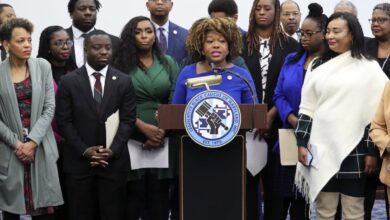How barbers are saving people from colon cancer

“It makes me feel like I’m giving back to the community,” said Spry, who opened The Shop in 2001. “In life, you’re either helping our hurting. You’re part of the problem or the solution.”
The Shop was the first establishment to implement University of Maryland’s Health In-Reach and Research Initiative (HAIR)—a one-of-a-kind outreach program that trains barbers to teach their clients about colorectal cancer and measures, like a colonoscopy, that can prevent it.
The initiative has just received a $200,000 grant from the Cigna Foundation, the charitable arm of the health insurance company, to expand to ten barbershops in Maryland. And on Thursday, it launched its first outpost in D.C. at Christopher’s Grooming Lounge on H Street NE—a two-year-old barber shop and salon with a predominately black customer-base.
So why barber shops, seemingly mundane places that don’t conjure images of healthcare or doctors offices?
Stephen Thomas, a behavioral scientist who now heads the University of Maryland’s Center for Health Equity, developed the HAIR initiative to reach African Americans in their own, often under-served, communities. In African-American communities, barbershops are often social hubs and customers build trusted relationships with their barbers over years. In the barber shop, people talk about their families, sports, relationships and plenty of awkward topics. So talking about health care wouldn’t seem so of the ordinary.
“No self-respecting black barber says they’ll get you in and out in 15 minutes,” says Thomas, who first developed an iteration of the HAIR initiative in 2001 in Pittsburgh. “You are going to be there for a half a day and it doesn’t matter how little hair you have.”
The effort is intended to have a ripple effect, starting in barber shops-and hopefully seeping out from there to customers’ families and friends. A 23-year-old getting his haircut may not need to think about getting a colonoscopy just yet, but he can tell his parents and grandparents to make an appointment.
Christopher’s, owned by Christopher Bradley, a D.C. native, has 9 barbers and 5 stylists, all of whom will eventually go through HAIR’s six-part training program so they can talk to their clients about colon cancer and other health problems plaguing black communities, like hypertension and diabetes. The idea isn’t to transform these hair specialists into medical experts, but rather make them fluent in information about diseases, preventative measures, and risks to the black population that HAIR’s leaders say everyone should know anyway.
“I’ve had people come in their car seats and now they’re driving themselves to their haircut,” says the manager at Christopher’s, Lamont Whitmire, a longtime barber in the area. “To me, this is the way it’s supposed to be…Our clients look forward to not only conversation, but wisdom.”
Under the Affordable Care Act, insurance companies must cover screening for colorectal cancer. Thomas says this development solves the economic barrier for many people who need to get a colonoscopy; now he needs to bridge the information gap so people know to get the procedure.
“We need to get out of the Ivory Towers and meet people where they live, where they worship, where they play and where they get their haircuts,” says Thomas. “We realize we are not reaching the people who need to hear our message.”
Thomas wants to address more than just colon cancer, which affects about 6 in 10,000 black people, and is working to transform these shops into mini-healthcare centers. Last Friday, a healthcare worker administered dozens of hypertension and breathing tests to people in Christopher’s Grooming Lounge.
A health care advocate from University of Maryland will frequently visit the participating salons in the region to map out customers’ family health histories so they know what diseases they’re most susceptible to. If someone doesn’t have health insurance, the barbers know who they should contact to help them navigate the system. The initiative is partnering with Capital Digestive Care, a large gastroenterology group, which will provide consultations and screenings to people reached through HAIR.
Thomas will track the success of the program—recording how many people get tested as a result of their interactions with their barbers—and apply for additional grant money to expand HAIR to more shops in the region.
So far, Thomas says the barbers and customers have been receptive and view barber shops as a natural place for this initiative.
“I’m 42, so I probably need one soon, right?” asks customer Kirwin Tromal, a New York resident who works at the Cafe Car on Amtrak and gets his haircut at Christopher’s when work brings him to D.C. “Everything educational is good.”
























































